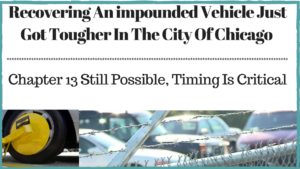 New Rules To Recover Impounded Vehicles
New Rules To Recover Impounded Vehicles
In recent months, there has been a tidal wave of activity surrounding bankruptcy, the City of Chicago, parking tickets and consumers trying to recover their impounded vehicles. For many years, it was common practice for the City of Chicago to release vehicles back to a debtor upon the filing of a chapter 13 bankruptcy. This was done in most cases as a legitimate way to recover collateral while also proposing a repayment plan for a portion of the parking ticket debt. Some of these cases actually made it through to completion of the plan while others died either a slow death or a quick death. Unfortunately, the system was abused by many individuals, pro se debtors, who had no intent on making a payment towards a chapter 13 plan. These people were convinced by nefarious individuals in and around the city of Chicago administrative building advising to simply file a chapter 13 to recover a vehicle. This practice continued until the U.S. Trustee cracked down on individuals who were given this bogus advice and recently, the City of Chicago fought back in an effort to maintain possession of those impounded vehicles. The city was ultimately successful in its first challenge which was the case of In Re Avila, case number 17 BK 870, Northern District of Illinois, March 21, 2017 opinion.
In Re Avila
The Avila decision basically said that the automatic stay in a chapter 13 bankruptcy case did not require the City of Chicago to return vehicles to debtors merely because they had filed a petition. Instead, the City of Chicago had a valid possessory lien on the vehicle and any act to maintain perfection of said possessory lien was excepted from the automatic stay under 11 USC, section 362(b)(3). Based upon that ruling, the debtor was pretty much at the mercy of the City of Chicago in terms of recovering vehicles.
Options For Release
The City of Chicago has enumerated some options for the release of a vehicle that has been booted and towed. The city is requiring prior to release, either a $1000 lump sum, adequate protection payment or 25% of the total debt, whichever is lower and a plan on file that provides for the remaining debt as secured. This means that the city does not want to accept a percentage plan since the total debt is technically secured by the possessory lien. The city also does not want to see attorney’s fees of the debtor paid ahead of their claims. If the debtor cannot come up with the adequate protection payment, the city will still release the car upon confirmation of a plan that provides for the parking ticket debt to be paid in full as secured with no fee jumping on the claim.
These options make it very difficult for a person to recover a vehicle through bankruptcy once it has been booted, towed and impounded. This is especially true for a vehicle that is paid in full. If there is an outstanding lien on the vehicle, the City of Chicago must notify the lienholder that it possesses the vehicle. That lienholder can then recover the vehicle by paying the applicable towing and storage fees and by agreeing to refund the city any net proceeds of a sale after the amount necessary to pay all lien holders is collected. The benefit here for the debtor is that if the finance company picks up the vehicle and then the debtor files chapter 13, the lienholder must return the vehicle to the debtor based upon the Thompson decision. The city will have lost its possessory lien upon release to the finance company. Although this seems like a decent or plausible option for the debtor, keep in mind that the debtor will be without a vehicle for possibly several weeks under this scenario.
File Bankruptcy Before The Tow
The bottom line is that the debtor’s must act quickly once they notice that their vehicle is booted. This is not something that a debtor is inherently good at. After all, the debtor has let parking tickets accumulate to the point that the vehicle can be impounded. Further, the debtor technically has only 24 hours to file a chapter 13 petition before the city can tow the vehicle. Within this time period, the debtor must meet with an attorney, sign a petition, complete credit counseling and satisfy other requirements not the least of which is paying a court filing fee. Although this can be done if the person is motivated and diligent, it is highly unlikely that many debtors will exercise this quick option available within 24 hours of a boot.
Sometimes the best option is just to let the vehicle remain with the city. If the vehicle does not have significant value, then the debtor would be well served to spend the $1000 that the city is demanding and put that towards another vehicle. Over the next several months, we will keep a pulse on how City of Chicago residents deal with booted vehicles in light of the recent court decision. The City of Chicago, through their counsel, have made it crystal clear that they will simply not be releasing vehicles as they had in years past.



